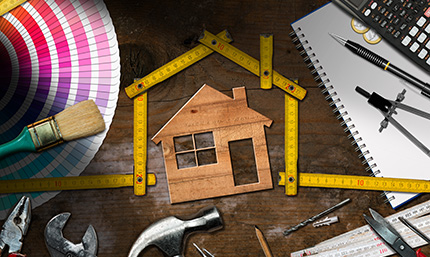News & Tips
HELOC Loan vs. Cash-Out Refinancing: Everything You Need to Know

Whether you’re looking to transform your home renovation dreams into reality, plant seeds for investments, or cover unforeseen expenses, you have a variety of options when it comes to how you can tap into your wellspring of home equity. But which option is best for you? In this article, we’ll explore the pros and cons of HELOC loans vs cash-out refinancing as well as their key similarities and differences to help you decide which works better for your financial needs and equity goals.
What is a HELOC loan?
A HELOC loan, or home equity line of credit, allows a borrower to tap into their home’s equity as needed during an allotted draw period (the timeframe you allowed to take money out of your HELOC). They’re similar to credit cards because they have a revolving line of credit, but they typically come with lower interest rates and a higher threshold.
In most cases, the borrower only has to pay for the interest accrued during the draw period and pay for the principal plus interest during the repayment period. Because the interest rates of HELOCs are adjustable based on the prime rate and margins, the monthly payments will vary.
| Término | 12 Month Intro Rate APR* "As Low As" | Thereafter APR* "As Low As" |
|---|---|---|
| Principal-and-Interest Option 7/7 |
4.24% | 7.50% |
| Opción para tasas solamente 10/10 |
8.25% | 8.25% |
Special Introductory Rate valid on Principal-and-Interest HELOC for 12 months. Thereafter, the HELOC will have a Variable Rate feature as described below. Introductory rate not available on Interest-Only HELOC.
Your actual interest rate will be based on the available equity in your home, the amount of your loan, your credit history, and product chosen. Other programs, rates, and terms may be available. Approval is subject to our usual credit criteria. Proof of homeowner’s insurance sufficient to cover all outstanding mortgages, including your SCCU equity loan, and any other obligations secured by the home and property, is required. Certain restrictions may apply.
No Closing Costs (Home Equity Loans): SCCU will waive typical third-party fees associated with closing a Home Equity loan, such as appraisal, photo inspection, recording, state tax stamps, title exam, and title insurance. Must be primary residence. Available on loans up to $250,000. For Fixed-Rate Home Equity Loans (2nd Mortgages) in the first lien position, valued at $50,000 or more, waived costs do not include prepaid escrow amounts. Additional fees may apply for loans over $100K, and/or for special Deed preparation requirements.
You must already be a member of the credit union, or establish membership, which requires a one-time $5 deposit to open and maintain a regular savings account. Offers and rates subject to change at any time.
Current Prime Rate
Principal-and-Interest HELOC
As low as Prime minus 0.50% w/floor (minimum rate) and ceiling (maximum rate) of 18.00%
Term: 14 years, the first 7 years you may draw against/utilize the credit line similar to that of a credit card and are required to make a monthly payments equal to 1.5% of your outstanding balance, with a $100 minimum. During these first 7 years, like a credit card, as you pay your outstanding balance your available credit will be replenished and may be drawn against/utilized again. Your available credit equals maximum credit line minus total outstanding balance. During the final 7 years you may no longer draw against/utilize the credit line. Whatever balance remains at the end of the first 7 years must be paid in monthly installments. Required monthly payment equals 1.5% of the prior month's balance, with a $100 minimum payment. There is a possibility of a balloon payment at the end of the repayment period. Once the monthly minimum payment due is satisfied, you may choose to make additional payments toward the principal. The interest rate is still variable, thus monthly payments will vary depending on the current interest rates. However, as an option you may refinance to renew your credit line or convert to a fixed home equity loan.
Interest-Only HELOC
As low as Prime plus 0.25% w/floor (minimum rate) and ceiling (maximum rate) of 18.00%
Term: 20 years, first 10 years you may draw against/utilize the credit line similar to that of a credit card and are required to make minimum monthly payments equal to accrued monthly interest determined by the current interest rate and your outstanding balance. During these first 10 years, if you choose to pay more than your interest-only payment, thus lowering your outstanding balance like a credit card, your available credit will be replenished and may be drawn against/utilized again. Your available credit equals maximum credit line minus total outstanding balance. During the final 10 years you may no longer draw against/utilize the credit line. Whatever balance remains at the end of the first 10 years must be paid in monthly installments. Each monthly payment includes principal and interest, and equals 1.5% of the prior month's balance, with a $100 minimum payment. There is a possibility of a balloon payment at the end of the repayment period. Once the monthly minimum payment due is satisfied, you may choose to make additional payments toward the principal. The interest rate is still variable, thus monthly payments will vary depending on the current interest rates. However, as an option you may refinance your credit line or convert to a fixed home equity loan.
Pros:
- Equity payment amount: The best thing about a HELOC is you can dip in and out of the account as needed for funds, and you only pay for what you use.
- Lower closing costs: Usually you won’t have to pay for closing costs with a HELOC, or they’re very small. At SCCU, we “waived” goodbye to typical third-party fees that other lenders may charge, so you save more!
Cons:
- Variable interest rates: HELOCs often have rates that vary along with the prime rate, so this can make it difficult to budget for monthly expenses. Here are our top tips to getting the best HELOC rates.
- Two payments: Since a HELOC loan is separate from the original mortgage, borrowers may have to make two separate monthly payments.
- Shorter terms: Whereas a mortgage is often between 15-30 years, a HELOC repayment period is often shorter at 5-10 years.
HELOC Qualifications and Restrictions:
Typically with HELOCs, your home will need to have 15 or 20% of its appraised value in equity. You’ll also need a debt-to-income ratio at or below 43% and a credit score of at least 620 or higher. It’s a good idea to shop around for HELOCs and double-check with lenders about “hidden” terms and conditions.
Lenders will also typically look at your payment history and for a combined loan-to-value (CLTV) ratio below 85%, which you can calculate by:
- Mortgage debt + desired line of credit / appraised value
- Example: Let’s say you owe $100,000 on your primary mortgage and want to take out a HELOC for $20,000, and your home is worth $200,000. So, the CLTV is .60 ($100,000 + $20,000/$200,000).
What is Cash-Out Refinancing?
A cash-out refinance is not a second mortgage; it’s when borrowers replace their original mortgage with a larger one and cash out on the difference to take advantage of their home’s equity. (It’s actually a check, but check-out refinancing just doesn’t have the same ring to it.)
The best way to explain a cash-out refinance is with an example:
- Let’s say you own a home worth $400,000, and you owe $150,000 on your mortgage. So, you have $250,000 in home equity.
- Lenders typically require borrowers to keep at least 20% equity in their home after a cash-out refinance. So, you’d need to keep at least $80,000 in your home (.20 X $400,000).
- You would be able to borrow up to $170,000 in cash ($250,000 - $80,000), and if you did, it would be added onto your original mortgage of $150,000. So, your new mortgage total would be $320,000.
However, with FHA loans, you can borrow as much as 85% of the home’s value and with VA loans, you can take out 100%66.
Pros:
- Lower interest rate: If you qualify for a good interest rate, it’s often lower than what it would be with your original mortgage or with a HELOC. A lower interest rate could help you shorten the loan’s term.
- One monthly payment: Since a cash-out refinance is not a second mortgage and replaces the original loan with a new one, borrowers can budget for just one monthly payment.
- Debt consolidation: Borrowers can use the money they cashed out to pay off high-interest loans and credit cards, which can help boost their credit score and save more money overall since mortgage loans have lower interest rates.
Cons:
- Closing costs and fees: Similar to when you first bought your home, you’ll have to cover the closing costs, which could be anywhere from 2% to 5% the loan amount. (In Florida, the average closing cost is about 2.58%.) You’ll need to cover title fees, appraisal fees, and credit report fees. These costs can add up quickly. While you can roll these into the loan, you may be paying more in interest this way.
- Private mortgage insurance: If you have less than 20% of equity in your home after a cash-out refinance, the lender may require you to pay private mortgage insurance payments (PMI). And PMI could cost an additional 0.22% to 2.25% of your loan balance per year.
Cash-Out Refinancing Qualifications and Restrictions:
Usually, lenders will require that you leave at least 20% equity in your home after a cash-out refinance, meet a minimum credit score of at least 620, and have a debt-to-income ratio below a certain percentage (typically 50%).
Note that it takes about three to five days after closing before the lender disperses the cash to the borrower, so if you need the cash quickly, this option may not be for you. Be sure to review the closing disclosure and ask the lender any questions you have.
(Little tip: You also have three days to cancel the loan after you close per the Truth in Lending Act.)
Key Similarities between HELOC Loans and Cash-Out Refinancing
- Flexible purposes: You can use your equity funds however you see fit with both a HELOC and a cash-out refinance, like paying for college tuition or building retirement savings. Generally, it’s recommended to use these funds to help grow your home’s equity, such as investing in value adding home improvement projects. Just keep in mind that your home is the collateral, so it’s important that you have a plan in place to pay back the loan to avoid a foreclosure.
- Tax deductions: The interest you pay on a HELOC is tax-deductible under certain conditions. According to the IRS those funds need to be used to “buy, build or substantially improve the taxpayer’s home that secures the loan.” You can also itemize deductions on your taxes for a cash-out refinance like with a first mortgage.
Key Differences between HELOC Loans and Cash-Out Refinancing
- Interest rates: Some lenders let you change from an adjustable to fixed interest (or vice versa) with a cash-out refinance. You don’t have as much say in interest rates with a HELOC.
- Equity retrieval: You receive the equity you’re borrowing as a lump sum of cash with a cash-out refinance mortgage, and you pay it back over time with your new, larger mortgage. A HELOC allows you to retrieve the equity as needed during the draw period, and you pay for what you use during the repayment period.
- Timeframes: You have a specific draw period and repayment period per the lender’s requirements when you take out a HELOC, and if it’s not paid in full upon the repayment period, you may have to make a lump sum payment (AKA a balloon payment). But you have more time to pay back the equity with a cash-out refinance term of 30 years — some borrowers may choose a shorter term, which typically mean higher monthly payments.
Which is better: A cash-out refinance or a HELOC loan?
When it comes down to choosing between a HELOC loan or a cash-out refinance, it helps to know exactly what you’d like to use the funds for. If you rather use the money for ongoing projects, a HELOC comes in handy, but if you’d like to take advantage of lower interest rates, a cash-out refinance is often the way to go.
It’s prudent to choose the avenue that works best for your budget and won’t cost you more in the long run because of added fees, closing costs, or interest rates. Also, be sure to consider how much longer you’ll be staying in your home to ensure that you can recoup closing costs from a cash-out refinance. And if you sell before paying back your HELOC, the lender will require the remaining balance as a lump sum.
Keep in mind that other options may work better to take advantage of your equity. We offer a tool that asks a few questions, recommends the best options for you, and provides rate and payment estimates, which you can go to here.
Ultimately, many lending experts recommend against using the funds for things that won’t get you much return on your equity, such as funding a vacation or a car. You’ve worked hard for that equity, so it’s a good idea to make it work for you!
SCCU is Here to Help You
We at SCCU know that mortgage loans can feel overwhelming and complicated, and we’re here to make the process as quick and painless as possible. We offer low rates, fast pre-approval decisions, and no pre-payment penalties for both HELOC loans and refinancing.
Plus, you get dedicated Member Service for the life of your loan. We’re happy to help you drill down to the best mortgage loan option for you, run the numbers, and answer any questions you may have.
You’re more than welcome to give our mortgage experts a call at 800-447-7228, ext. 8976. Or, you can get in contact with us through other convenient methods that suit you, such as WhatsApp messaging or Live Chat.
























.jpg?width=430&height=257&ext=.jpg)





